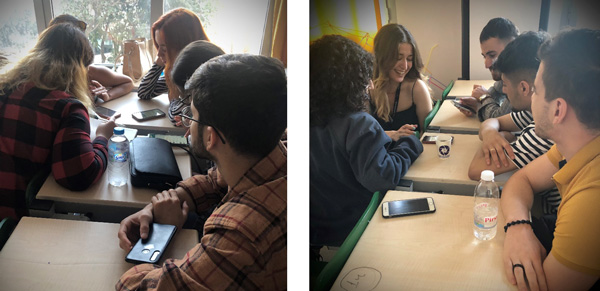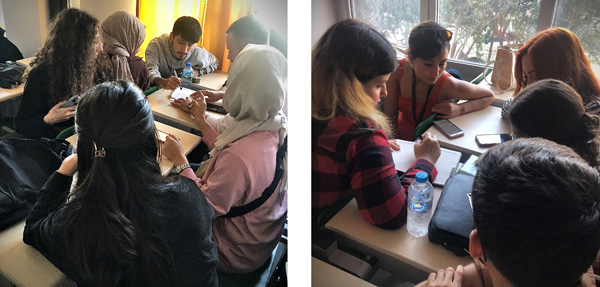Using JBI Evidence Sources in Nursing Education

June 2025
Havva Arslan Yürümezoğlu, RN, PhD. Dokuz Eylul University, Nursing Faculty, Department of Nursing Management, İzmir-Türkiye
1. Introduction/background:
Dokuz Eylül University Faculty of Nursing in Turkey offers comprehensive undergraduate education with an emphasis on evidence-based practice (EBP). Within the undergraduate nursing curriculum, students are equipped with the necessary skills to access and utilize evidence-based information to inform their clinical decision making. The utilization of resources such as those within the JBI EBP Database are particularly useful in providing students with valuable insights into evidence-based healthcare practices.. As an example the JBI Health Professionals' Teamwork Education Best Practice Information Sheet (BPIS) was used as a learning activity in the Nursing Management course, which is a third year course in the nursing program (https://www.hemed.org.tr/wp-content/uploads/2021/05/Saglik-Kurumlarinda-Saglik-Calisanlarinin-Ekip-Calismasi-Egitimi.pdf).
2. Description of the key activities and strategies that were undertaken
The Nursing Management course is conducted using team-based learning method. In the first week of the course, teams consisting of groups of 6-8 students with different learning styles are determined. Teams engage in the learning topic of each week together with different learning activities and share their results with the class. In the fourth week of the course during the 2023-24 academic year, teams were given a sample scenario emphasizing the importance of team collaboration. They were tasked with solving the problems that inhibited team collaboration in this scenario by discussing the JBI BPIS and other resources. The version of the JBI BPIS, translated into Turkish and approved by JBI, was shared with the students. Each team then presented their strategies for solving the problem in the scenario to the class. At the end of the lesson, they gave written feedback on how the JBI BPIS contributed to their learning.

3. Outcomes of activities
This learning activity demonstrated that the JBI BPISs are an easily accessible resource for students, containing reliable information and providing rich learning opportunities. In team-based learning activities, students are often unsure about the accuracy and evidence content of the information in the sources they access to solve problems. In this activity, students spent more time discussing problem solving strategies because they knew they had access to reliable and evidence-based information. In their written feedback, students stated the following;
"The JBI Best Practice Sheet resource taught us the importance of organizational culture and knowing the working methods of successful teams for teamwork. We also learned that we need to take different learning styles into account in trainings and that using reflective learning in teamwork trainings can be effective. This information helped me to better understand teamwork training and to be an effective healthcare professional in my daily practice."
"From the JBI Best Practice Sheet resource, we learned that it is important to create opportunities for effective team members to share their experiences in teamwork trainings. In particular, we have learned that it could be useful to share strategies used by units that have good team collaboration in the organization in teamwork trainings."
"The JBI Best Practice Sheet resource has taught us that the experience and skills of each member of the team can contribute to team collaboration trainings by making them visible. We learned that the differences in our learning styles are also important to take into account in these trainings."
4. Lessons for the future: sustainability and transferability
Teaching staff of the Nursing Management course at Dokuz Eylul University provided feedback which indicates the continued use of JBI Best Practice Information Sheets as a trustworthy and useful teaching resource.
“I experienced that the JBI BPISs are a very effective tool as they contain concise, reliable and evidence-based information that can be used in students' in-class learning activities. The JBI BPISs are accessible for each week of the course and can be used as a learning resource and a tool for in-class learning activities.”
“I decided to continue this learning activity applied in the course. I also plan to use the JBI BPIS, which is also translated into Turkish, for the topic of job satisfaction and burnout.”
“I made a plan to use the strategies contained in this JBI BPIS for senior students to use in planning their in-service training learning on "Effective Team Collaboration.”

The incorporation of JBI BPIS within the Nursing Management course at Dokuz Eylul University Faculty of Nursing has proven to be an effective educational strategy. The positive feedback from both students and teaching staff underscores the value of these resources in fostering an evidence-based approach to learning and professional development. The sustained use of the JBI BPIS as a reliable, evidence-based resource will continue enrich the educational experience and better prepare students for their future roles in healthcare.